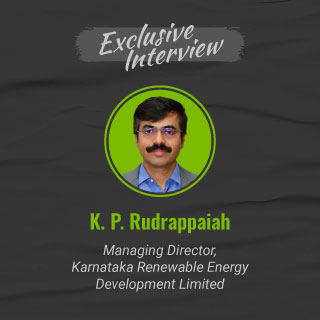
Advancing its path towards energy transition, Karnataka has made commendable strides in increasing energy efficiency in the state. The state’s designated agency for energy conservation – Karnataka Renewable Energy Development Limited (KREDL), has been instrumental in driving the State’s energy conservation efforts. In recognition of these efforts, Karnataka was conferred the first prize in the “State Designated Agency (Group-l)” category at the Ministry of Power’s National Energy Conservation Awards held in December 2022.
AEEE recently had the opportunity to interview Shri K. P. Rudrappaiah, Managing Director, KREDL. In the exclusive interview, Shri Rudrappaiah discussed the state’s role in energy transition, impactful initiatives to upscale energy efficiency, and opportunities for economy-wide adoption of energy efficiency at the state level.
Q1. The process of forming a state-level steering committee for energy transition is in process in all the states. What is your perspective on the role of energy efficiency in energy transition at the state level?
At the United Nations Climate Change Conference’s COP26 summit in Glasgow in November 2021, India’s Hon’ble Prime Minister announced the five-fold “PANCHAMRIT” goals to address the effects of climate change. These goals are step towards meeting the greenhouse gas (GHG) reduction targets, specifically the reduction in emission intensity of the economy by 45% by 2030 as compared to 2005 level, including at the state levels.
The states play a crucial role in this endevaour to achieve state-specific goals on sustainable development in the most energy-efficient manner. To steer the energy transition measures by optimizing the growing power demand and mamaximizing energy efficiency, biomass and green hydrogen tracks, a committee has been formed with the senior officials from the concerned departments, including Power, New and Renewable, Industries, Transport, Housing, Urban Development, Rural Development, Agriculture, Environment and PWD, among others.
This committee shall:
- Act per the guidelines issued/to be issued by the Government of India for the Energy Transition, in line with the COP-26 commitments.
- Encourage new energy efficiency technologies in all sectors.
- Promote energy efficiency standards by optimising parameters in various components and systems.
Q2. What are the three most impactful programs in place in your State in the energy efficiency domain?
Karnataka has undertaken various impactful initiatives, including and beyond notifications of relevant regulations to upscale energy efficiency in the state across different sectors. In this regard, a few initiatives are detailed:
- As an SDA, KREDL is undertaking significant initiatives to implement various EC & EE activities in the state as per the BEEs guidelines. Among these initiatives, the demonstration of energy efficiency projects is one of the most impactful and successful programmes by KREDL in the state. The demonstration programme aims to showcase the effectiveness of energy efficiency devices/technologies with its implication of cost savings through practical demonstration and to facilitate the state government in replicating these demonstration projects through various departments/agencies.
- The Government of Karnataka notified the “Energy Conservation and Energy Efficiency (EC & EE) Policy 2022-27” in the State Gazette on 11.03.2022. The policy seeks to promote energy efficiency initiatives through a policy directive to ensure energy security in the state.The implementation of the policy aims to conserve around 744 million kWh of electricity consumption during the Policy period (i.e., five years: – 2022-27), and this would result in the reduction of CO2 emissions of around 6,10,080 tonnes. This policy covers five major sectors through which the energy savings targets will be met. The five major sectors and the saving targets are as follows:
- Municipal Sector – 304 Million Units
- Domestic Sector – 117 Million Units
- Agricultural Sector – 230 Million Units
- Commercial Sector – 79 Million Units
- Industrial Sector – 14 Million Units
- In the transport sector, Karnataka was the first Indian state to roll out an Electric Vehicle policy. The state has significantly increased the installation/adoption of EV charging infrastructure and EV vehicles across the country. Further, the state is in ambitious pursuit of a green vehicle transition and implementing a holistic system to track the impacts of EE initiatives in the transport sector in terms of energy savings, energy intensity and fuel intensity. Also, the various segments of vehicles in Bengaluru are encouraged to move towards EVs to achieve 100% electric mobility by 2030.
Q3. Please share your State’s strategy to enhance energy efficiency adoption in the priority sectors in the near and medium term
Concerning the industry sector, the state is deepening and widening the PAT scheme by increasing the number of Designated Consumers (DCs) and including more and newer sectors in the state. The implementation or mandatory adoption of Karnataka’s Econiwas Samhita (KENS) for residential buildings is ongoing through incorporation in state bye-laws. Further, the state has also successfully enforced the Karnataka Energy Conservation Building Codes (KECBC) in the state.
Q4. What opportunities and collaboration do you envision for cross-cutting energy efficiency adoption? What are the three topmost challenges in the economy-wide adoption of energy efficiency at the state level?
The state government supports the implementation and adoption of energy efficiency through financing assistance, subsidies and budgetary allocations for SDA. Further, there is smooth collaboration and coordination among state departments for sharing ideas and knowledge on implementation strategies for energy conservation and energy efficiency.
However, some challenges still prevail. These include:
- Delayed enforcement/enablement of existing policies and regulations.
- Lack of awareness, interest and confidence among the public (such as MSME, households, municipalities and agriculture) in realizing energy savings from energy efficiency projects.
- Low availability of staff dedicated to energy efficiency for enabling the implementation/identification of EE projects across the state.
This interview was facilitated and compiled by Priyami Dutta and Meghaa Gangahar with inputs from Snehashis Tapadar, Sangeeta Mathew and Dr. Bhaskar Natarajan from Alliance for an Energy Efficient Economy.
